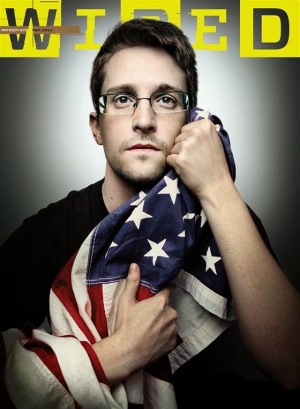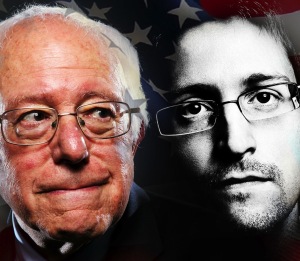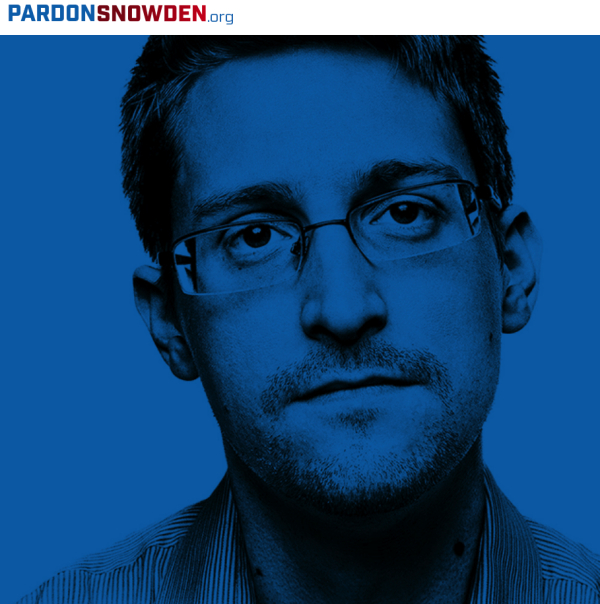THE AMERICAN CIVIL LIBERTIES UNION: The government has charged Snowden under the Espionage Act, a World War One-era law that doesn’t distinguish between selling secrets to foreign governments and giving them to journalists working in the public interest. If Snowden were to be tried under the charges he faces, any argument that his actions benefited the public would be inadmissible in court. The Pardon Snowden campaign will work through the end of Obama’s administration to make the case that Snowden’s act of whistleblowing benefited the United States and enriched democratic debate worldwide, and we’re asking citizens to write to the president via our website.
Snowden has already been vindicated in multiple ways: A panel appointed by the president to review the NSA’s surveillance program recommended dozens of reforms. Last year, a federal appeals court found the NSA’s call-tracking program revealed by Snowden was illegal. The following month, Congress passed the USA Freedom Act, which ended bulk collection of call data by the US government. That bill marked the first time Congress has acted to rein in government surveillance since the 1970s. Journalists at The Guardian and Washington Post won the Pulitzer Prize for their reporting on Snowden’s disclosures.
Former Attorney General Eric Holder said, “We can certainly argue about the way in which Snowden did what he did, but I thin k that he actually performed a public service by raising the debate that we engaged in and by the changes that we made.” And Obama himself commented that the debate sparked by the whistleblower “will make us stronger.” It’s indisputable that our democracy is better off thanks to Snowden, and it’s precisely for cases like his that the pardon power exists. President Obama should use this power for good instead of leaving an American whistleblower stranded in exile. MORE
k that he actually performed a public service by raising the debate that we engaged in and by the changes that we made.” And Obama himself commented that the debate sparked by the whistleblower “will make us stronger.” It’s indisputable that our democracy is better off thanks to Snowden, and it’s precisely for cases like his that the pardon power exists. President Obama should use this power for good instead of leaving an American whistleblower stranded in exile. MORE
RELATED: pardonsnowden.org
THE GUARDIAN: Speaking on Monday via a video link from Moscow, where he is in exile, Snowden said any evaluation of the consequences of his leak of tens of thousands of National Security Agency and GCHQ documents in 2013 would show clearly that people had benefited. “Yes, there are laws on the books that say one thing, but that is perhaps why the pardon power exists – for the exceptions, for the things that may seem unlawful in letters on a page but when we look at them morally, when we look at them ethically, when we look at the results, it seems these were necessary things, these were vital things,” he said. “I think when people look at the calculations of benefit, it is clear that in the wake of 2013 the laws of our nation changed. The [US] Congress, the courts and the president all changed their policies as a result of these disclosures. At the same time there has never been any public evidence that any individual came to harm as a result.” MORE
WIRED: The message arrives on my “clean machine,” a MacBook Air loaded only with a sophisticated encryption package. “Change in plans,” my contact says. “Be in the lobby of the Hotel ______ by 1 pm. Bring a book and wait for ES to find you.” ¶ ES is Edward Snowden, the most wanted man in the world. For almost nine months, I have been trying to set up an interview with him—traveling to Berlin, Rio de Janeiro twice, and New York multiple times to talk with the handful of his confidants who can arrange a meeting. Among other things, I want to answer a burning question: What drove Snowden to leak hundreds of thousands of top-secret documents, revelations that have laid bare the vast scope of the government’s domestic surveillance programs? MORE
 THE GUARDIAN: Bernie Sanders leads a chorus of prominent public figures calling for clemency, a plea agreement or, in several cases, a full pardon for the National Security Agency whistleblower Edward Snowden. […] Sanders joins 20 other prominent public figures – from Hollywood actors and rock musicians to politicians, professors and Black Lives Matter activists – who call on Barack Obama to find some way of allowing Snowden to return home to the US from exile in Russia. The Guardian’s voices are raised in the week that Oliver Stone’s film, Snowden, is released in the US and that a coalition of groups including the ACLU and Amnesty International launch a new campaign for a presidential pardon before Obama steps down.
THE GUARDIAN: Bernie Sanders leads a chorus of prominent public figures calling for clemency, a plea agreement or, in several cases, a full pardon for the National Security Agency whistleblower Edward Snowden. […] Sanders joins 20 other prominent public figures – from Hollywood actors and rock musicians to politicians, professors and Black Lives Matter activists – who call on Barack Obama to find some way of allowing Snowden to return home to the US from exile in Russia. The Guardian’s voices are raised in the week that Oliver Stone’s film, Snowden, is released in the US and that a coalition of groups including the ACLU and Amnesty International launch a new campaign for a presidential pardon before Obama steps down.
Among the writers in the Guardian are Daniel Ellsberg, the whistleblower who released the Pentagon Papers in the 1970s, who calls for Snowden to be allowed to make a public interest defense in any US trial. From the world of arts, actor Susan Sarandon and director Terry Gilliam, novelist Barry Eisler and Sonic Youth singer Thurston Moore all make impassioned calls for an Obama pardon.
Senior politicians from both sides of the Atlantic, including former US senator Mark Udall, UK parliamentarian David Winnick and German Green party member Hans-Christian Ströbele all fly the flag for a Snowden homecoming. Similar calls are made by public intellectuals including Noam Chomsky, Cornel West and Sanders’ former Democratic presidential rival and Harvard law professor, Lawrence Lessig. MORE

